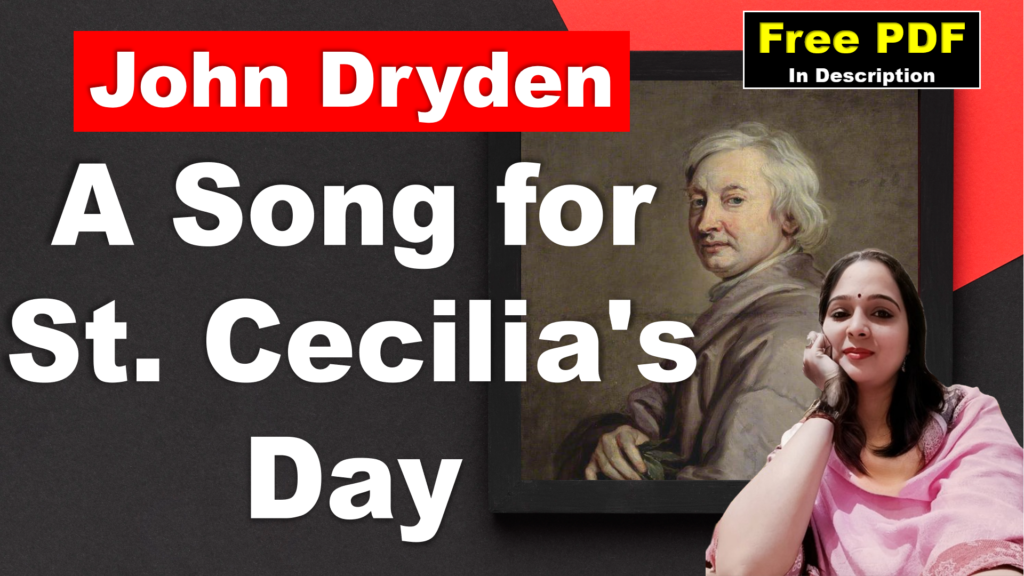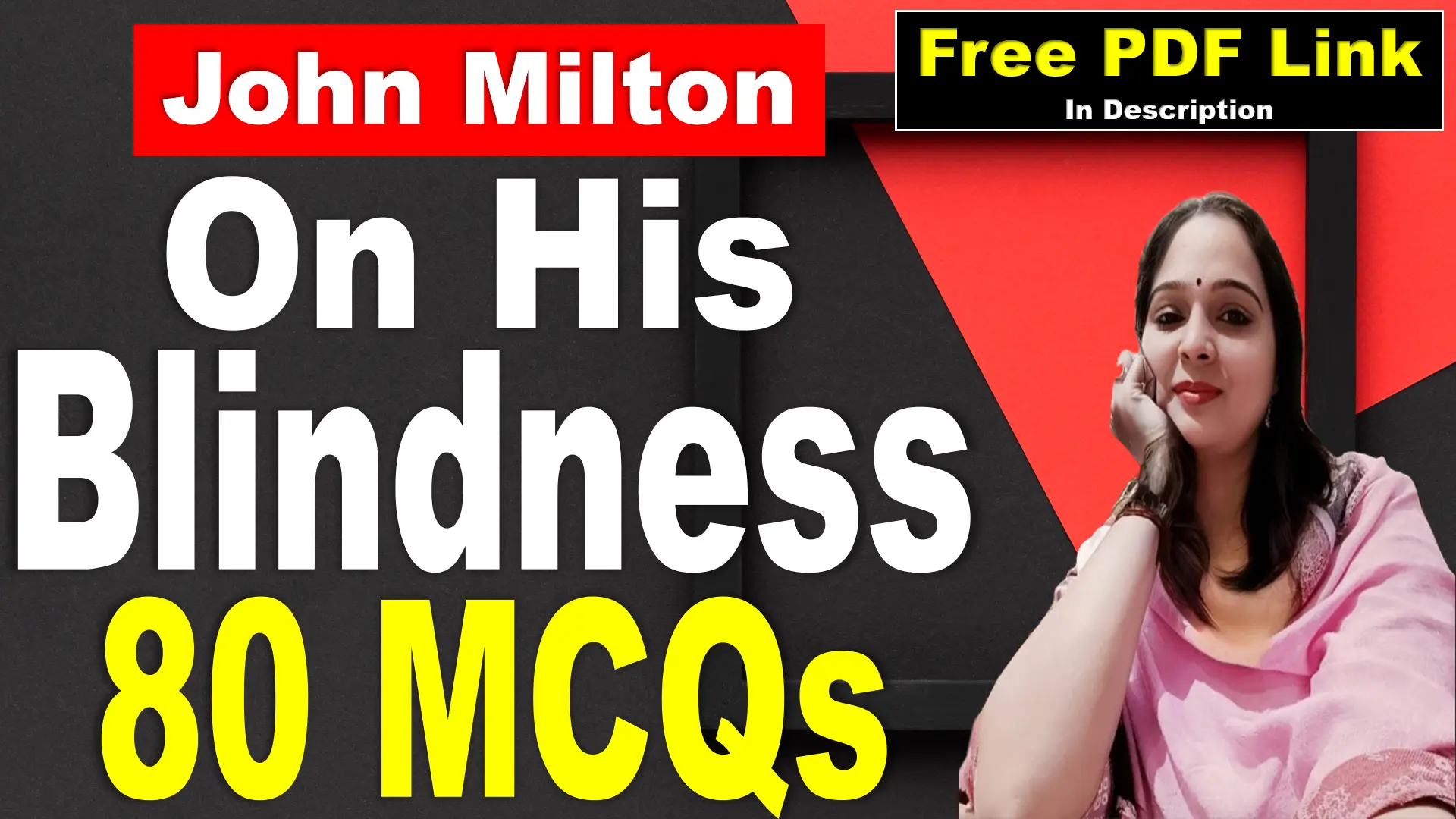
A Song for St. Cecilia’s Day Questions Answers
Very Short Answer Questions
1. What does the speaker say is the origin of the universe?
Music
2. What does the speaker say music can do to people’s emotions?
Move, inspire, and control them
3. What are some of the human emotions that music can express?
Love, joy, grief, and anger
4. What instrument does the speaker praise in the sixth stanza?
The organ
5. What does the speaker say the organ can inspire?
Religious awe
6. To whom does the speaker compare Saint Cecilia?
Orpheus
7. What does the speaker say Saint Cecilia’s music was so powerful that it could do?
Attract the attention of angels
8. What does the speaker say music will do at the end of the universe?
Untune the sky
9. What is the poem celebrating?
The power of music
10. What does the speaker say music is not just?
A pleasant sound
11. What does the speaker say music is a force that can do?
Create order and beauty out of chaos
12. What does the speaker say music can also do to people?
Connect them to the divine
13. What does the speaker say music can do to people’s minds?
Raise and quell their passions
14. What does the speaker say the trumpet’s loud clangor can do?
Excite people to arms
15. What does the speaker say the soft complaining flute can do?
Discover the woes of hopeless lovers
16. What does the speaker say sharp violins proclaim?
Their jealous pangs and desperation
17. What does the speaker say the organ’s sacred notes can do?
Inspire holy love and mend the choirs above
18. What does the speaker say Saint Cecilia’s music was so powerful it could do?
Make an angel mistake earth for heaven
19. What does the speaker say will happen at the last and dreadful hour?
The crumbling pageant of the universe will be devoured
20. What will the trumpet be heard on high at the last and dreadful hour?
To summon the dead and the living to judgment
21. What does the speaker claim is the source of all harmony in the poem?
Music
22. What is the power of music according to the speaker?
Music can create order and beauty out of chaos, move and inspire people, and even connect people to the divine.
23. What instrument is the speaker particularly fond of in the poem?
The organ
24. Who is Saint Cecilia?
Saint Cecilia is the patron saint of music.
25. Who is Orpheus?
Orpheus is a legendary Greek musician who was able to charm all living things with his music.
26. What does the speaker mean when they say that music “untunes the sky”?
The speaker means that music is so powerful that it can even disrupt the natural order of things.
27. What is the poem’s grand chorus about?
The poem’s grand chorus celebrates the power of music to create and destroy.
28. What is the poem’s overall message about music?
The poem’s overall message is that music is a powerful force that can have a profound impact on the world and on the people in it.
29. What is the poem’s tone?
The poem’s tone is celebratory and awe-struck.
30. What is the poem’s theme?
The poem’s theme is the power of music.
31. What is the poem’s setting?
The poem’s setting is a church or other place of worship.
32. What is the poem’s speaker like?
The poem’s speaker is a passionate admirer of music who is deeply impressed by its power.
33. What is the poem’s significance?
The poem is significant because it is a powerful and moving celebration of the power of music.
34. What are some of the symbols used in the poem?
Some of the symbols used in the poem include the organ, Saint Cecilia, Orpheus, and the grand chorus.
35. What are some of the literary devices used in the poem?
Some of the literary devices used in the poem include personification, simile, metaphor, and hyperbole
36. Why is the poem still relevant today?
The poem is still relevant today because it celebrates the power of music, which is a universal and timeless force.
Short Answer Questions
Question 1: How does the poet illustrate in this poem that music excites man to action?
Answer: music can evoke a wide range of emotions in people, including anger, courage, and determination, which can motivate them to take action. It also hints at the fact that music can be used for both good and evil purposes, depending on the intentions of the musician and the listener.
Question 2: What miracle did St. Cecilia do?
Answer: St. Cecilia invented the sacred Organ. when St. Cecilia invented the organ and begin to sing her Holy song in praise of God, she worked a miracle. An angel in Heaven heard her music, left heaven and came down to earth mistaking it for Heaven and listen to her song with the help of her Organ.
Question 3: “In this poem we are told of the power of music in raising and quelling the various passions of man.” Illustrate.
Answer: We are told of the power of music in raising and quelling the various passions of man. At first this power is illustrated in the case of trumpet whose loud clangour excites us to arms. The lute expresses the soft complaining of lovers. Similarly the violin gives full expression of the fiercer passions of man. The organ inspires Holy love in the heart of listeners.
Question 4: How will music bring this universe to its end?
Answer: Dryden says in the Grand Chorus that on the doom’s day Gabriel will appear and blow his trumpet. The effect of his trumpet will be that all the living will die. The dead shall come out of their Graves and stand before God. Then God will pronounce his judgement according to the good and bad deeds performed by human beings during their lifetime. Thus the same power of music with which God has created this universe shall bring this universe to its end.
Question 5: How did this universe begin according to Dryden?
Answer: Dryden says that creation of this universe began by the wonderful power of divine music. Thence the music of spheres ran through all the length and breadth of the musical scale. The Heavenly music passed through the whole range of notes in creating all the little creatures and big creatures down from the smallest to the biggest animals. The creation ended in the creation of man.





